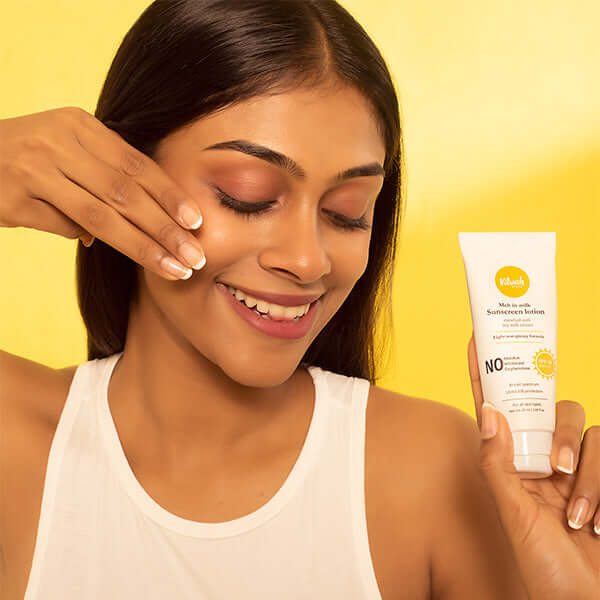Summer is here, It's time to beat the heat by taking that long-pending short picnic or a trip to the beaches. Yet, it's also crucial to protect your skin from damaging UV radiation. It takes more than just hats and scarves to protect your skin. So use sunscreen to give your skin ultimate protection. Our everyday body care routine must include sunscreen, especially in the summer. The market is loaded with a lot of sunscreens, and with the tongue-twisting ingredients present, it becomes a real hustle to find the right one. It is best to go for a sunscreen with natural and minimal ingredients that serve the purpose. Sometimes even all those endless scrolls do not help.
Now that you are here, you can sit back and relax because we did all the research to give you the importance of and tips to choose sunscreen.
Why is sunscreen important?
The sun emits two types of ultraviolet rays that can harm your skin: UVA and UVB. UVA rays can penetrate deep into the skin and cause premature aging, such as wrinkles, while UVB rays cause sunburn and are the primary cause of skin cancer.
Sunscreen is a protective barrier that helps block these harmful rays from penetrating your skin. It contains active ingredients that absorb or reflect UV radiation, preventing it from causing damage to your skin. Regular use of sunscreen can help prevent sunburn, reduce the risk of skin cancer, and slow down the signs of aging.
Look for broad-spectrum protection
Look for a sunscreen that offers broad-spectrum protection when making your selection. UVB rays produce sunburns, whereas UVA rays have been linked to early aging and skin damage. Any sort of UV light might increase your risk of developing skin cancer. This is another reason why you should select a sunscreen that protects you from both dangerous rays.
Check for the active ingredients
The active ingredients in sunscreen determine its effectiveness in protecting your skin from the sun. Chemical sunscreens are more common and often include ingredients such as oxybenzone, silicones, and other harmful chemicals. These ingredients have been connected to allergic responses and hormone imbalance. On the other hand, natural sunscreens contain no such harsh chemicals, which are safer and more effective at blocking UV rays.
Avoid harmful ingredients
Apart from active ingredients, sunscreens can contain several other ingredients that can be harmful to your health and the environment. Perfumes and oxybenzone are some of these substances, they can irritate the skin and trigger allergies. Oxybenzone is particularly harmful to the environment, as it can damage coral reefs and disrupt marine ecosystems. So, when choosing sunscreen, make sure to read the label and avoid any harmful ingredients in your skin care products.
Choose SPF wisely
The Sun Protection Factor is a measure of how effectively a sunscreen protects your skin from UVB rays. Higher SPF values indicate higher levels of protection. However, it is essential to note that SPF only measures protection against UVB rays, not UVA rays. While a higher SPF may seem like a better option, there is little evidence to suggest that sunscreens with SPF values higher than 50 provide significantly more protection. A PA+++ sunscreen gives you the best protection. It is a rating that you might consider while purchasing skin care products. Instead, choose a sunscreen with an SPF of 30 or 50 and reapply it every two hours. Add on to your face care products.
Consider your skin type
When choosing a sunscreen, it is essential to consider your skin type. If you have sensitive skin, you may want to choose a natural sunscreen with no active ingredients. The ingredients do not cause skin irritation. If you have oily or acne-prone skin, you may want to choose a lightweight sunscreen that won't clog your pores or form a white cast after using it. Look for sunscreens that are labeled as non-comedogenic, which means they are less likely to cause acne.


 Track Order
Track Order












Leave a comment
All comments are moderated before being published.
This site is protected by hCaptcha and the hCaptcha Privacy Policy and Terms of Service apply.